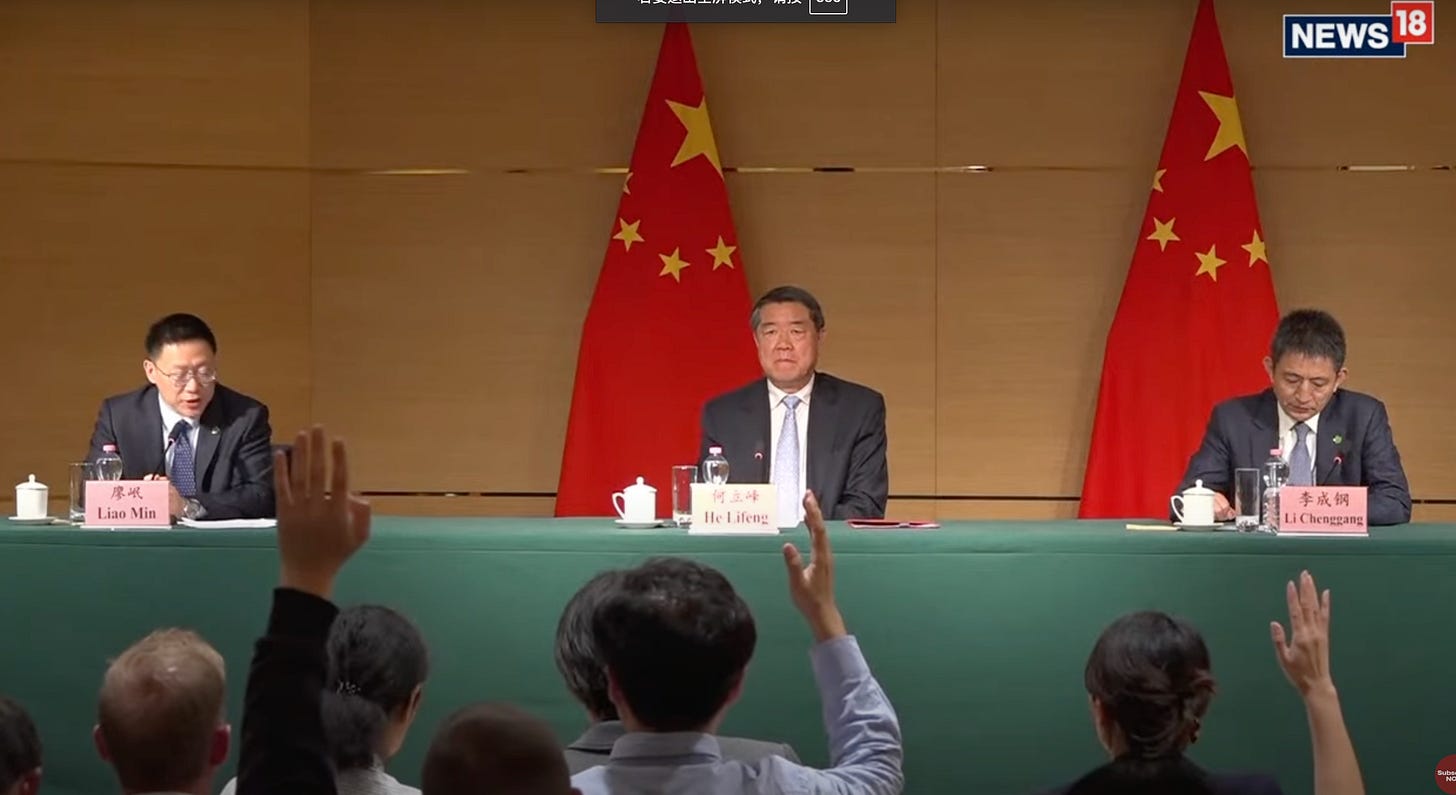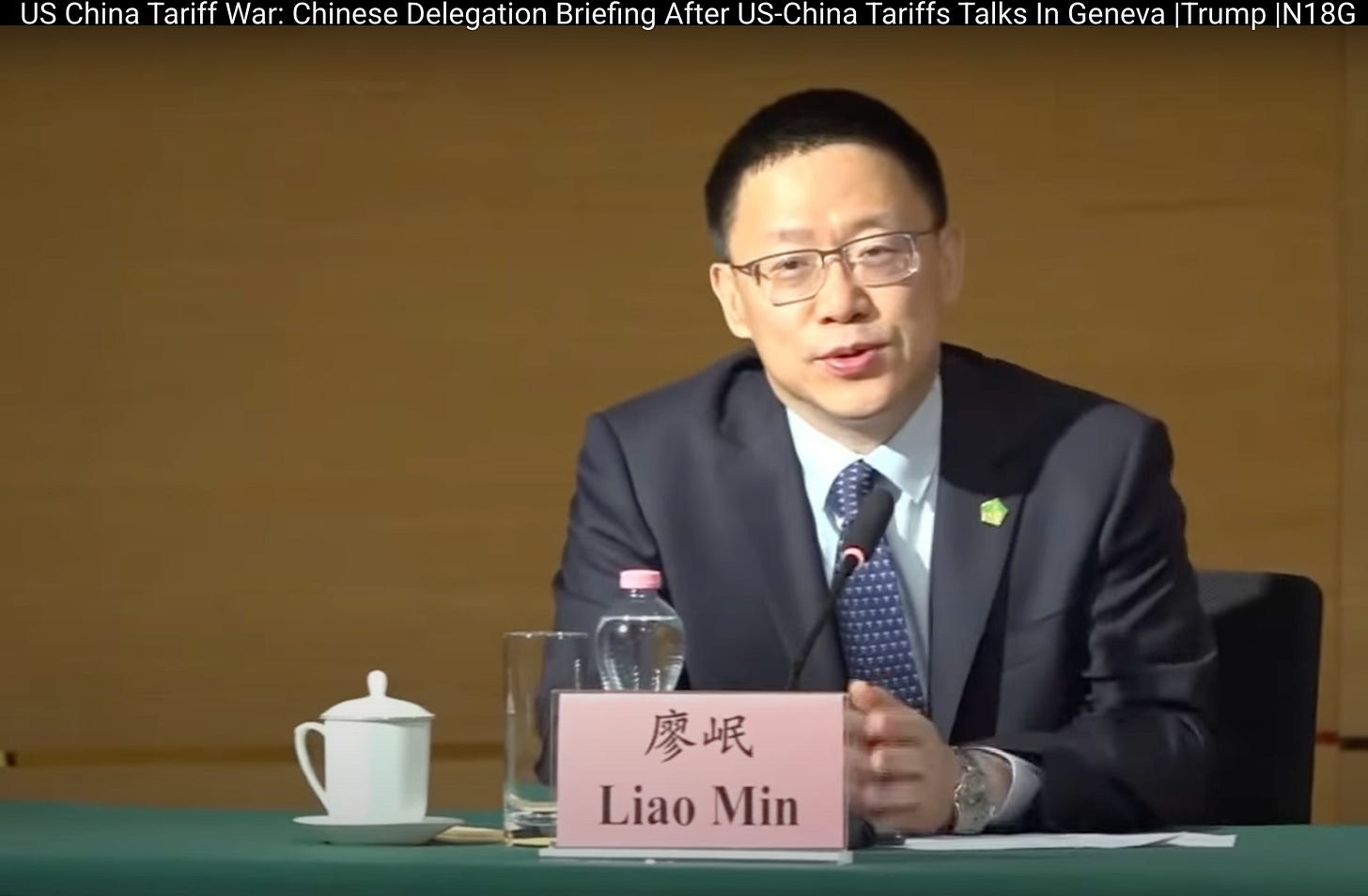Transcript of Chinese Govt Press Conference in Geneva on Trade Talk with the U.S.
Both sides said it went well.
The first trade talk between China and the U.S. in the second Trump administration apparently went surprisingly well in Geneva on the weekend, according to both sides on Sunday May 11.
The White House released a statement declaring a “trade deal”
Here is the footage of Secretary of the Treasury Scott Bessent and U.S. Trade Representative Ambassador Jamieson Greer making the remarks.
On the Chinese side, Vice Premier He Lifeng, Li Chenggang, Vice Commerce Minister and International Trade Representative, and Liao Min, Vice Minister of Finance, met the press in Geneva.
A few thoughts:
Against the de-facto trade embargo now in place as a result of steep tariffs, lack of direct communications, and oftentimes defiant rhetoric, the negotiation apparently went surprisingly well, at least according to the both sides at the table. Yes, they agreed to details that are not yet public and also establish a “consultation mechanism” which is just more talks.
But that’s always the first step and it hasn’t exactly been helpful to have the embarrassment of White Hosue saying “we are talking” and then the Foreign Ministry in Beijing saying “we are not.”
The details are still lacking today and the two sides, according to China, agreed to only release them tomorrow (May 12). My pure speculation is there will be some sort of announcement of Chinese purchase of U.S. products.
That is because Greer, the USTR, said he is “confident that the deal we struck with our Chinese partners will help us to work toward resolving that national emergency” of huge trade deficits. As you will read below, a state-run Xinhua News Agency reporter raised a question about that. Li Chenggang, China’s Vice Commerce Minister and International Trade Representative, said “any possible deal to be reached, will definitely be in the interest or in the development interest of China's own.” That is effectively a “yes,” and my reading of his explanation is basically “it will be what China needs anyways.” Plus, bulk buying is among the lowest-hanging fruits out there and gives something concrete that President Donald Trump can brag about.
It feels strange to hear both sides praising the other side for being professional and the working atmosphere being pretty good - almost as if they liked one another! That’s likely not the impression you get from listening to domestic voices in the U.S. and China.
Below is the transcript of the Chinese side’s press conference
Liao Min, Vice Minister of Finance:
Ladies and gentlemen, good evening. Welcome to today's press conference. I'm your moderator, Vice Minister of Finance of China, Liao Min. On the 10th and 11th of May, the Chinese Lead Person on Trade and Economic Affairs and Vice Premier of the Chinese State Council, He Lifeng, and the US lead person, US Treasury Secretary Scott Bessent, held a high-level meeting on China-US trade and economic issues. Today, we are hosting this press conference and His Excellency, Vice Premier of the State Council, He Lifeng will brief you on that meeting as well as China's positions on relevant issues. Attending today's press conference are also the China International Trade Representative and Vice Minister of Commerce, Mr. Li Chengang. He is going to take your questions later on. First of all, I would like to invite Vice Premier He Lifeng to make an introduction.
He Lifeng, Vice Premier
Friends from the press, good evening. On the 10th and 11th of May, as the Chinese Lead Person on China-US Trade and Economic Affairs, I held a high-level meeting with the US lead persons. US Treasury Secretary Scott Bessent and USTR Ambassador Jamieson Greer. The two sides held in-depth exchanges on trade and economic issues of their respective concern. The atmosphere of the meeting was candid, in-depth, and constructive. The meeting achieved substantial progress and reached important consensus.
The two sides agreed on establishing a consultation mechanism for trade and economic issues, identify the lead persons on each side and we'll carry on further consultations relating to trade and economic issues of their respective concerns. The two sides will finalize relevant details as soon as possible and will issue a joint statement that was reached at the meeting on May 12th.
I would like to take this opportunity to give our special thanks to the Swiss government, who is our host this time, for their enormous support and warm hospitality. At the same time, our American colleagues’ professionalism and diligence was also impressive.
Over the past three months or so. The global trade war, which was provoked or initiated by the United States, has caught global attention. China's position towards this trade war has been clear and consistent. That is China doesn't want to fight a trade war because trade wars produce no winners. But if the US insists on forcing this war upon us, China will not be afraid of it and will fight to the end.
Under the current circumstances, this meeting has caught high attention from the international community. And thanks to the concerted efforts from both sides, the meeting has been productive and has been an important first step taken by the two sides to properly resolve their differences through equal-footed dialogue, and also for bridging differences and deepening cooperation. This meeting has laid the foundation and created the conditions for that effort.
Today’s world is undergoing changes unseen in a century. China-U.S. trade and economic relations are not only of great importance to China and the United States but also have a major impact on the global economic stability and development. The nature of the China-US economic and trade relations is mutually beneficial and win-win. The key is to follow the principle of mutual respect, peaceful coexistence and win-win cooperation, and find ways to properly resolve issues through equal-footed dialogue and consultation in order to foster a stable, sound, and sustainable China-US trade and economic relationship.
We are ready to work together with the US side to actively implement the important consensus reached by our heads of state on the 17th of January in their phone call. And with a pragmatic approach to problem solving, we'll be happy to engage in candidate dialogue and equal-footed consultation, manage our differences, tap into the potential for cooperation, expand the list of collaborative outcomes, and make the pie of mutual benefits bigger. We're gonna promote new development in the China-US trade and economic relations and inject more certainty and stability into the world economy. Thank you.
Liao Min:
Thank you, Vice Premier He Lifeng.
Xinhua News Agency reporter:
Vice Premier He Lifeng, I'm with the Xinhua News Agency. The US White House has released information saying that the potential deal between the US and China will help address the $1.2 trillion trade deficit. What's China's comment on this?
He Lifeng:
As regards the outcomes of the meeting between China and the United States, it will be reflected in tomorrow's joint statement. For the specifics that you're asking for, I would like to ask Mr. Li Chengang to answer your question.
Li Chenggang, Vice Minister of Commerce and International Trade Representative
Thank you, friends from the press. China has always [been] pursuing win win outcomes in its trade and economic negotiations. So, and therefore, any possible deal to be reached, will definitely be in the interest or in the development interest of China's own. Thank you.
CGTN reporter:
I'd like to ask China's view on the atmosphere of this meeting.
Li Chenggang:
Just as Vice Premier He has commented over the last couple of days, the economic and trade teams of China and the United States held candid, in-depth, and constructive dialogue and reached important consensus.
And I reckon that this meeting has reflected the following three characteristics.
One is mutual respect. Guided by the consensus of the two heads of state, the two sides proceeded from the general picture of China US trade and economic relations, carefully listen to each other's concerns and take in full consideration of each other's national realities as well as differences in development stage and systems, the two sides have showed sincerity and promoted substantial progress in the meeting.
Second is equality and mutual benefit. In the meeting, the two sides accommodated each other's concerns and development interests. The two sides upheld the rational objective and pragmatic spirit, moved towards each other and actively sought for the largest common denominator in their cooperation, accumulating conditions for the sound, stable, and sustainable development of China-US economic and trade relations.
Third is professionalism and high efficiency. The economic and trade teams from both sides have upheld a professional spirit and tapped into their respective expertise, and use the limited time of the last couple of days to have intensive consultations. They had candid and in-depth exchange of discussions on relevant issues in the trade and economic sphere, creating a solid foundation for the consensus that was to be reached in this meeting. Thank you.
Liao Min:
We'll continue to raise questions, but in the interest of time, this will be the last question.
Hugo Miller, Bloomberg News
Thank you for taking my question. Very simply, can you tell us anything more about what this negotiation mechanism is and anything more you are, - I understand - issuing in a joint statement tomorrow. Can you say anything more about when that will be tomorrow, before the markets open, for example? Hugo Miller with Bloomberg News.
Li Chenggang:
Thank you for your questions. As regards the mechanism, actually, Vice Premier He also touched upon it just now. At this meeting, the two sides agreed to establish a consultation mechanism on trade and economic issues. As far as the Chinese side is concerned, Vice Premier He Lifeng is going to be the lead person for China-US trade and economic affairs. And he's going to co-lead the. mechanism together with the U.S. lead person.
Led by the lead persons on both sides, the working teams from both sides are going to have regular and irregular communications relating to trade and economic issues. The timing as well as the venue or location for future communications will be determined by both sides. And with the facility of modern telecommunication technologies, we have lots of options, including teleconferencing and making phone calls.
As regards the second part of your question, based on the understanding reached between China and the United States, we are not in a position today to release more of the substance of what we agreed on. As regards the timing for the release of the joint statement, as we say back in China, 好饭不怕晚 if the dishes are delicious, then timing is not a matter. So I think no matter when this statement is released, it's going to be good news for the world.
Liao Min:
Thank you very much. I'd like to thank Vice Premier He Lifeng for his time. The time for the press conference is rather short, but it's very informative. And thank you again for your attention. We are going to keep you updated about follow-up information and hope you could keep covering the developments.








Thank you, Zichen. Do you know what specific terms are being referenced here?
“We are ready to work together with the US side to actively implement the important consensus reached by our heads of state on the 17th of January in their phone call.”